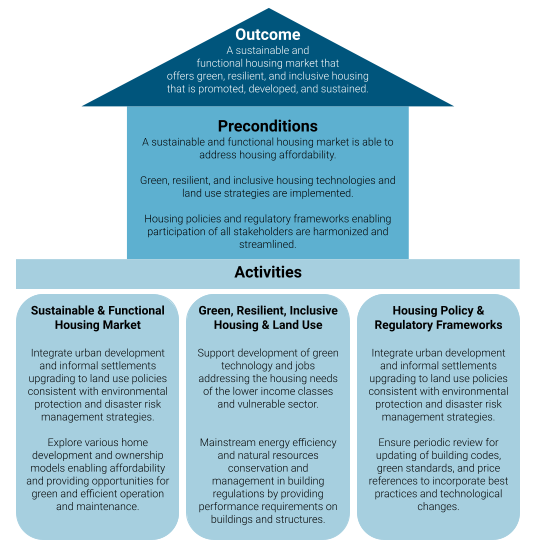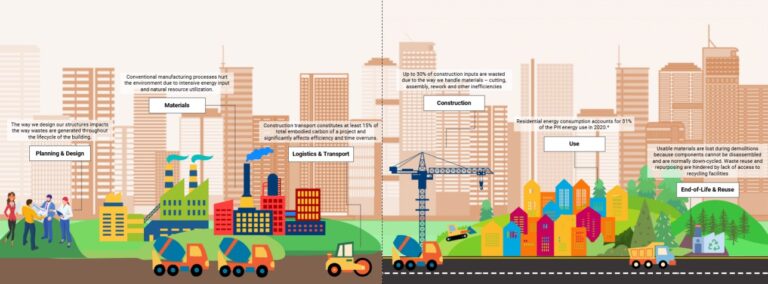Click here to view the full report
As underserved populations continue to be adversely impacted by the effects of climate change, there is the need for a more sustainable housing sector which offers adequate, affordable, and sustainable housing. In the Philippines, the housing backlog is expected to reach 22 million by 2040. While the National Climate Action Plan has cited green building as a key strategy to climate change adaptive housing, without an operational green building strategy, the transformation to more sustainable practices poses great challenges to the housing sector.
This study aimed to answer the question “how might we make green housing more affordable and accessible for financial service providers, builders, and end-users” in the Philippines for Habitat for Humanity. This was accomplished by 1.) defining and analyzing sustainable, green, and circular housing and construction concepts, 2.) mapping the housing value chain to identify stages, stakeholders, approaches, challenges and opportunities to greening the affordable housing value chain, and 3.) developing a Theory of Change to explain how a green and circular housing value chain can be achieved.
Through mapping the housing value chain, emerging themes, solutions and innovations, enabling interventions, and capabilities and preconditions were identified. One emerging theme is that the business case for green, while largely enabled by financing and policy, does not necessarily require newer construction technologies, they simply must allow for increased supply of housing units. Additionally, there is an opportunity to establish planning and design codes standards that are aligned to green principles. Some of the solutions and innovations identified across the value chain include passive design strategies and energy and water capture technologies; more efficient construction technologies to reduce resources, waste, and cost; and waste reuse models in material sourcing and production. Additionally, it was found that innovative financing and policy can be used to accelerate housing production by attracting homebuilders to venture into green housing development. Lastly, the Theory of Change developed through this study found that transforming the housing value chain to green unlocks necessary preconditions to ensure a functional housing value chain that can enable homebuilders to participate in the production of housing stock through green financing mechanisms, and at the same time provide green and resilient shelter for end-users.
From this study, key recommendations include 1.) reviewing and updating current building standards to incorporate green and resilient building, as well as the adoption of performance-based standards for housing to guide homebuilders to adopt the use of materials and methodologies that contribute to a greener housing construction value chain, 2.) land-use planning and implementation of development controls should enable efficient delivery of green housing development, and 3.) the government must step in to become both principal project sponsors and active regulators of housing projects to ensure affordability and timely delivery.
While the business case of green is demonstrated, the transition to greener affordable housing development in the Philippines must be backed by effective policy to further validate its business case and attract investments, ensuring a sustainable and productive housing sector for all.
Figure: Theory of Change to achieve a sustainable and functional housing market that offers green, resilient, and inclusive housing
Click here to view the full report
E4C 2021 PROGRAM MANAGEMENT TEAM: Mariela Machado, Senior Program Manager; Erin Peiffer, Research Manager; Marilynn Holguín Clover, Program Coordinator; Jonathan Kemp, Program Specialist; Carolina Rojas, Program Associate
ADVISORS AND COLLABORATORS: Jessan Catre, Terwilliger Center for Innovation in Shelter, Habitat for Humanity International; Jerick Axalan, Market Systems and Entrepreneurship Specialist at Habitat for Humanity International; Juan Pablo Vargas, Senior Advisor, Innovation, Entrepreneurship, and Markets Systems, Applied Innovation; Jennifer Oomen, Director, Applied Innovation, Terwilliger Center for Innovation and Shelter
This research was completed as part of the 2021 E4C Fellowship program. Learn more about the Fellows who worked on this research collaboration by connecting with them on LinkedIn: Dean Ashton Plamenco


No Comments.